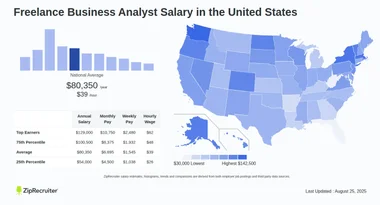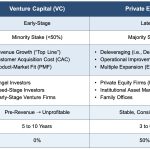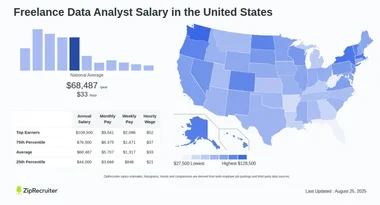Determining a reasonable hourly rate for a contract business analyst can be challenging, as it depends on various factors such as experience, industry, location, and project complexity. Business analysts play a critical role in bridging the gap between business needs and technical solutions, making their expertise highly valuable. Freelance or contract rates often differ from salaried positions, reflecting the flexibility and specialized skills they bring to the table. This article explores key considerations for setting an appropriate hourly rate, including market trends, certifications, and regional variations, to help both analysts and employers establish fair and competitive compensation for contract-based work.

- What is a Reasonable Hourly Rate to Charge for a Contract Business Analyst?
- How much do freelance business analysts charge?
- What is the hourly rate for a business analyst in the US?
- What is the hourly rate for freelance analyst?
- How much should I charge for contract work?
- Frequently Asked Questions from Our Community
- What factors influence the hourly rate for a Contract Business Analyst?
- What is the average hourly rate for a Contract Business Analyst?
- How can I determine a fair hourly rate for my services as a Contract Business Analyst?
- Should I charge a fixed rate or an hourly rate as a Contract Business Analyst?
What is a Reasonable Hourly Rate to Charge for a Contract Business Analyst?
Determining a reasonable hourly rate for a contract business analyst depends on several factors, including experience, location, industry, and the complexity of the project. On average, contract business analysts charge between $50 to $150 per hour, but this range can vary significantly based on the factors mentioned above. Below, we explore these factors in detail to help you understand how to set a competitive and fair rate.
1. How Does Experience Impact the Hourly Rate?
Experience plays a significant role in determining the hourly rate for a contract business analyst. Entry-level analysts with less than 3 years of experience typically charge between $50 to $75 per hour. In contrast, seasoned professionals with over 10 years of experience can command rates of $100 to $150 per hour or more. Clients are often willing to pay a premium for analysts who bring proven expertise and a track record of successful projects.
See Also What Are the Downsides of Being a Venture Capitalist?
What Are the Downsides of Being a Venture Capitalist?2. How Does Location Affect the Hourly Rate?
Geographical location is another critical factor. Business analysts in high-cost cities like New York or San Francisco often charge higher rates, ranging from $90 to $150 per hour, due to the increased cost of living. In contrast, analysts in smaller cities or rural areas may charge $50 to $90 per hour. Remote work has also influenced rates, as analysts can now work with clients globally, potentially adjusting their rates based on the client's location.
3. What Role Does Industry Play in Determining Rates?
The industry in which a business analyst works can significantly impact their hourly rate. For example, analysts in finance, healthcare, or technology often charge higher rates due to the specialized knowledge required. Rates in these industries can range from $100 to $150 per hour. In contrast, analysts working in less specialized industries may charge $60 to $90 per hour.
4. How Does Project Complexity Influence the Hourly Rate?
The complexity of the project is another key factor. Projects requiring advanced skills, such as data modeling, process optimization, or system integration, often justify higher rates. For highly complex projects, analysts may charge $120 to $150 per hour. Simpler projects, such as basic requirements gathering, may fall within the $50 to $80 per hour range.
See Also What Do Venture Capitalists Look for When Deciding to Invest in an Idea and a Team
What Do Venture Capitalists Look for When Deciding to Invest in an Idea and a Team5. What Are the Market Trends for Contract Business Analyst Rates?
Market trends also influence hourly rates. As demand for business analysts grows, particularly in industries undergoing digital transformation, rates have seen an upward trend. According to recent surveys, the average hourly rate for contract business analysts in 2023 is approximately $85 to $120 per hour. However, this can vary based on economic conditions and regional demand.
| Factor | Hourly Rate Range |
|---|---|
| Experience (Entry-Level) | $50 - $75 |
| Experience (Senior-Level) | $100 - $150+ |
| Location (High-Cost Cities) | $90 - $150 |
| Location (Low-Cost Areas) | $50 - $90 |
| Industry (Specialized) | $100 - $150 |
| Industry (General) | $60 - $90 |
| Project Complexity (High) | $120 - $150 |
| Project Complexity (Low) | $50 - $80 |
How much do freelance business analysts charge?

Factors Influencing Freelance Business Analyst Rates
The rates charged by freelance business analysts can vary significantly based on several factors. These include:
See Also What Are the Major Advantages of Being a Venture Capitalist?
What Are the Major Advantages of Being a Venture Capitalist?- Experience Level: Analysts with more years of experience typically charge higher rates due to their proven track record and expertise.
- Industry Specialization: Specialists in high-demand industries like finance or technology often command higher fees.
- Geographical Location: Rates can differ based on the cost of living and market demand in the analyst's location.
- Project Complexity: More complex projects requiring advanced analytical skills and tools may incur higher charges.
- Certifications: Holding recognized certifications like CBAP or PMI-PBA can justify higher rates.
Average Hourly Rates for Freelance Business Analysts
Freelance business analysts typically charge between $50 to $150 per hour, depending on the factors mentioned above. Here’s a breakdown:
- Entry-Level Analysts: $50 - $75 per hour.
- Mid-Level Analysts: $75 - $100 per hour.
- Senior-Level Analysts: $100 - $150 per hour.
Project-Based Pricing for Freelance Business Analysts
Some freelance business analysts prefer to charge on a project basis rather than hourly. This approach often depends on:
- Scope of Work: Clearly defined deliverables and milestones.
- Duration: Short-term vs. long-term projects.
- Client Budget: Negotiations based on the client’s financial constraints.
Freelance Business Analyst Rates by Region
Geographical location plays a significant role in determining freelance business analyst rates. Here’s a regional comparison:
See Also How is Carry or Carried Interest Split Between Employees and General Partners in a Vc Firm
How is Carry or Carried Interest Split Between Employees and General Partners in a Vc Firm- North America: $75 - $150 per hour.
- Europe: $60 - $120 per hour.
- Asia: $30 - $80 per hour.
How to Negotiate Rates with Freelance Business Analysts
Negotiating rates with freelance business analysts requires a clear understanding of the project requirements and budget. Consider the following:
- Define Project Scope: Clearly outline deliverables to avoid scope creep.
- Compare Rates: Research average rates in your region and industry.
- Leverage Long-Term Relationships: Offer repeat business for discounted rates.
What is the hourly rate for a business analyst in the US?

The hourly rate for a business analyst in the US typically ranges between $30 and $80 per hour, depending on factors such as experience, location, industry, and the complexity of the role. Entry-level analysts may earn closer to $30-$40 per hour, while senior-level professionals with specialized skills can command rates of $70-$80 or more.
See Also What Are the Key Differences Between Private Equity and Venture Capital
What Are the Key Differences Between Private Equity and Venture CapitalFactors Influencing the Hourly Rate of a Business Analyst
The hourly rate for a business analyst is influenced by several key factors:
- Experience: Analysts with more years of experience or advanced certifications often earn higher rates.
- Location: Rates vary significantly by region, with major metropolitan areas like New York or San Francisco offering higher pay.
- Industry: Specialized industries such as finance or technology may pay more due to the complexity of the work.
- Skills: Proficiency in tools like SQL, Tableau, or Agile methodologies can increase earning potential.
- Contract vs. Full-Time: Freelance or contract analysts often charge higher hourly rates compared to salaried employees.
Average Hourly Rates by Experience Level
The hourly rate for a business analyst varies based on their experience level:
- Entry-Level: Typically earns between $30-$40 per hour.
- Mid-Level: Can expect rates of $45-$60 per hour.
- Senior-Level: Often commands $70-$80 or more per hour.
Regional Variations in Hourly Rates
Geographic location plays a significant role in determining hourly rates:
- High-Cost Areas: Cities like New York, San Francisco, and Boston offer rates of $60-$80 per hour.
- Mid-Range Areas: In cities like Atlanta or Dallas, rates range from $45-$65 per hour.
- Low-Cost Areas: In smaller cities or rural areas, rates may be closer to $30-$50 per hour.
Industry-Specific Hourly Rates
Different industries offer varying compensation for business analysts:
- Finance and Banking: Rates often exceed $70 per hour due to the complexity of financial systems.
- Technology: Analysts in tech companies earn between $60-$80 per hour.
- Healthcare: Rates range from $50-$70 per hour, depending on the role's requirements.
Freelance vs. Full-Time Hourly Rates
Freelance business analysts often charge higher rates compared to full-time employees:
- Freelance Analysts: Typically charge $50-$100 per hour to account for self-employment taxes and lack of benefits.
- Full-Time Employees: Earn lower hourly rates, often between $30-$60 per hour, but receive benefits like health insurance and paid leave.
What is the hourly rate for freelance analyst?

Factors Influencing the Hourly Rate for Freelance Analysts
The hourly rate for freelance analysts can vary significantly based on several factors. These include:
- Experience Level: Analysts with more years of experience typically command higher rates.
- Industry: Specialized industries like finance or healthcare may offer higher rates due to the complexity of the work.
- Geographical Location: Rates can differ based on the cost of living and demand in different regions.
- Skill Set: Analysts with niche skills or certifications may charge more.
- Project Complexity: More complex projects often justify higher hourly rates.
Average Hourly Rates for Freelance Analysts
The average hourly rate for freelance analysts generally ranges between $30 and $100, depending on the factors mentioned above. Here’s a breakdown:
- Entry-Level Analysts: Typically charge between $30 and $50 per hour.
- Mid-Level Analysts: Usually charge between $50 and $75 per hour.
- Senior-Level Analysts: Can charge $75 to $100 or more per hour.
How to Determine Your Freelance Analyst Rate
Setting the right hourly rate as a freelance analyst involves careful consideration. Here are some steps to help you determine your rate:
- Research Market Rates: Look at what other analysts with similar skills and experience are charging.
- Calculate Your Expenses: Consider your living expenses, taxes, and business costs.
- Assess Your Value: Evaluate your unique skills, certifications, and the value you bring to clients.
- Start with a Baseline: Begin with a rate that covers your costs and adjust as you gain more experience and clients.
Industries with the Highest Pay for Freelance Analysts
Certain industries tend to offer higher hourly rates for freelance analysts due to the specialized knowledge required. These include:
- Finance and Banking: Analysts in this sector often earn higher rates due to the complexity and sensitivity of financial data.
- Healthcare: The need for data analysis in healthcare, especially with patient data, commands higher rates.
- Technology: Tech companies often pay premium rates for analysts who can interpret complex data sets.
- Consulting: Management consulting firms frequently hire freelance analysts at competitive rates.
Negotiating Your Hourly Rate as a Freelance Analyst
Negotiating your rate is a crucial skill for freelance analysts. Here are some tips to help you negotiate effectively:
- Know Your Worth: Be confident in the value you bring to the table and don’t undersell yourself.
- Be Transparent: Clearly communicate your rates and the rationale behind them to potential clients.
- Offer Flexibility: Be open to negotiating terms, such as project-based pricing or retainer agreements, if the hourly rate is a sticking point.
- Highlight Your Expertise: Emphasize your unique skills and past successes to justify your rate.
How much should I charge for contract work?

Factors to Consider When Setting Your Contract Work Rate
Determining how much to charge for contract work involves evaluating several key factors. These include your experience, the complexity of the project, and the market demand for your skills. Below are some critical considerations:
- Experience and Expertise: More experienced professionals can command higher rates due to their proven track record and specialized knowledge.
- Project Scope: Larger or more complex projects may justify higher rates, especially if they require specialized skills or longer time commitments.
- Market Rates: Research what others in your industry and region are charging to ensure your rates are competitive.
Calculating Your Hourly Rate for Contract Work
To determine your hourly rate, start by calculating your desired annual income and dividing it by the number of billable hours you expect to work in a year. Here’s how to break it down:
- Desired Annual Income: Decide how much you want to earn annually, including taxes, benefits, and business expenses.
- Billable Hours: Estimate the number of hours you can realistically work and bill clients each year, accounting for vacations and non-billable tasks.
- Hourly Rate Formula: Divide your desired income by your billable hours to arrive at your base hourly rate.
Understanding Value-Based Pricing for Contract Work
Value-based pricing focuses on the value you provide to the client rather than the time spent on the project. This approach can lead to higher earnings and more satisfied clients. Consider the following:
- Client ROI: Assess how much value your work will bring to the client’s business, such as increased revenue or cost savings.
- Project Impact: Charge based on the significance of the project to the client’s goals or operations.
- Negotiation: Be prepared to justify your rates by demonstrating the tangible benefits your work will deliver.
Comparing Contract Work Rates Across Industries
Contract work rates vary widely depending on the industry. Understanding these differences can help you set competitive and fair rates. Here’s what to consider:
- Industry Standards: Research typical rates for your field, such as IT, marketing, or consulting.
- Geographic Location: Rates often differ based on the cost of living and demand in your region.
- Skill Demand: High-demand skills, such as software development or data analysis, often command premium rates.
Negotiating Your Contract Work Rate with Clients
Negotiation is a critical skill for contract workers to ensure fair compensation. Here are some strategies to help you negotiate effectively:
- Know Your Worth: Be confident in your skills and the value you bring to the table.
- Be Transparent: Clearly explain your pricing structure and the rationale behind your rates.
- Flexibility: Be open to adjusting your rate based on the project’s scope, timeline, or long-term potential.
Frequently Asked Questions from Our Community
What factors influence the hourly rate for a Contract Business Analyst?
The hourly rate for a Contract Business Analyst can vary significantly depending on several factors. These include the analyst's experience level, the complexity of the project, the industry, and the geographic location. For instance, a Business Analyst with 10+ years of experience working in a high-demand industry like finance or technology in a major city may command a higher rate compared to someone with less experience in a smaller market. Additionally, specialized skills such as data analytics, process improvement, or familiarity with specific tools like SQL or JIRA can also increase the rate.
What is the average hourly rate for a Contract Business Analyst?
The average hourly rate for a Contract Business Analyst typically ranges between $50 and $100 per hour, depending on the factors mentioned earlier. Entry-level analysts may charge closer to $50-$70 per hour, while highly experienced professionals or those with niche expertise can charge $100 or more. In high-cost regions like New York or San Francisco, rates may be on the higher end of this spectrum, whereas in smaller cities or regions with lower living costs, rates may be more moderate.
How can I determine a fair hourly rate for my services as a Contract Business Analyst?
To determine a fair hourly rate, start by researching the market rates in your area and industry. Platforms like Glassdoor, Payscale, or freelance websites can provide insights. Consider your experience, skills, and the value you bring to the project. Additionally, factor in your business expenses, such as taxes, insurance, and software tools. A good rule of thumb is to aim for a rate that reflects your expertise while remaining competitive in the market.
Should I charge a fixed rate or an hourly rate as a Contract Business Analyst?
Whether to charge a fixed rate or an hourly rate depends on the nature of the project. For projects with a well-defined scope and timeline, a fixed rate may be more appropriate, as it provides clarity for both parties. However, for projects with uncertain or evolving requirements, an hourly rate is often better, as it ensures you are compensated for the actual time spent. Be sure to outline the terms clearly in your contract to avoid misunderstandings.
Leave a Reply


Our Recommended Articles